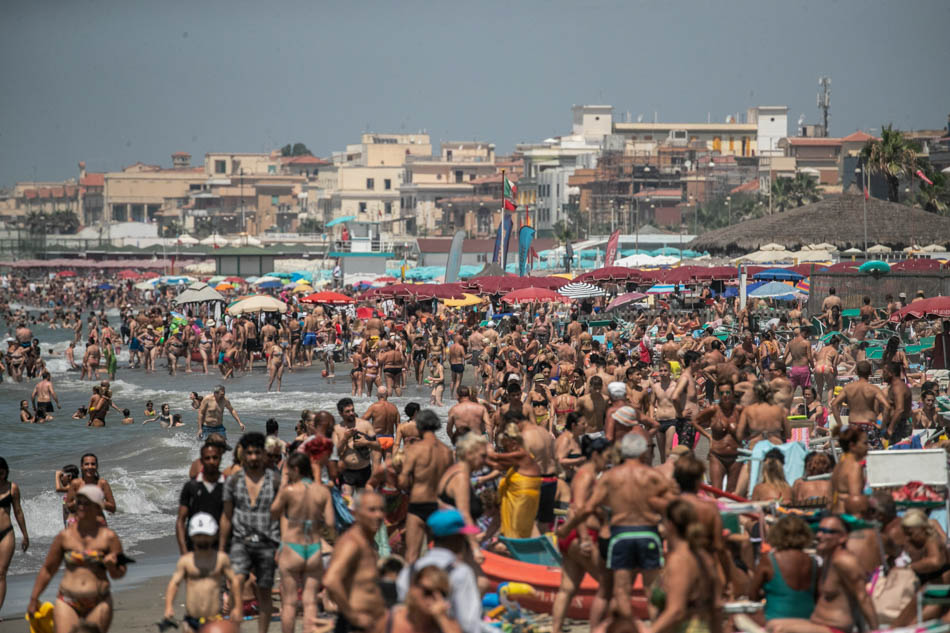Southern Europe swelters under 'Cerberus' heat wave
ADVERTISEMENT

Welcome, Kapamilya! We use cookies to improve your browsing experience. Continuing to use this site means you agree to our use of cookies. Tell me more!
Southern Europe swelters under 'Cerberus' heat wave
Deutsche Welle
Published Jul 14, 2023 09:42 AM PHT
Southern European countries were reeling under heat wave "Cerberus" Thursday, with temperatures set to break records yet again.
Southern European countries were reeling under heat wave "Cerberus" Thursday, with temperatures set to break records yet again.
The European Space Agency (ESA), whose satellites monitor land and sea temperatures, said Italy, Spain, France, Germany and Poland were all affected by scorching temperatures.
The European Space Agency (ESA), whose satellites monitor land and sea temperatures, said Italy, Spain, France, Germany and Poland were all affected by scorching temperatures.
The Italian Meteorological Society named the heat wave "Cerberus" after a three-headed dog that guarded the underworld in Greek mythology.
The Italian Meteorological Society named the heat wave "Cerberus" after a three-headed dog that guarded the underworld in Greek mythology.
Temperatures were expected to climb to 48 degrees Celsius (118 degrees Fahrenheit) on the islands of Sicily and Sardinia – potentially the hottest temperatures ever recorded in Europe, according to the ESA.
Temperatures were expected to climb to 48 degrees Celsius (118 degrees Fahrenheit) on the islands of Sicily and Sardinia – potentially the hottest temperatures ever recorded in Europe, according to the ESA.
ADVERTISEMENT
Europe recorded its highest-ever temperature in the summer of 2021 in Italy, where Sicily recorded 48.8 degrees Celsius.
Europe recorded its highest-ever temperature in the summer of 2021 in Italy, where Sicily recorded 48.8 degrees Celsius.
Weather alerts in Spain, Italy, Greece
Weather alerts were in place in Spain's Canary Islands, Italy, Cyprus and Greece.
Weather alerts were in place in Spain's Canary Islands, Italy, Cyprus and Greece.
Greek authorities are expecting temperatures to surge to 43 degrees Celsius (109.4 Fahrenheit) or 44 degrees Celsius on Friday or Saturday.
Greek authorities are expecting temperatures to surge to 43 degrees Celsius (109.4 Fahrenheit) or 44 degrees Celsius on Friday or Saturday.
In Italy, health authorities issued a red warning alert for at least ten Italian cities, including Rome, Florence, Bologna and Perugia.
In Italy, health authorities issued a red warning alert for at least ten Italian cities, including Rome, Florence, Bologna and Perugia.
In Greece, the government ordered the suspension of work between 12:00 p.m. and 5:00 p.m. (between 0900 and 1400 GMT) in areas where blistering temperatures pose a threat to health.
In Greece, the government ordered the suspension of work between 12:00 p.m. and 5:00 p.m. (between 0900 and 1400 GMT) in areas where blistering temperatures pose a threat to health.
ADVERTISEMENT
Ambulances were parked near major tourist attractions like the Acropolis in Athens.
Ambulances were parked near major tourist attractions like the Acropolis in Athens.
The government has also requested that private companies allow employees with health conditions to work remotely.
The government has also requested that private companies allow employees with health conditions to work remotely.
In Sibenik, a town on the Croatian coast, firefighters worked to extinguish bushfires sparked by hot temperatures.
In Sibenik, a town on the Croatian coast, firefighters worked to extinguish bushfires sparked by hot temperatures.
Heat waves occur when high pressure in the atmosphere moves in and pushes warm air toward the ground so we begin feeling a lot hotter.
Heat waves occur when high pressure in the atmosphere moves in and pushes warm air toward the ground so we begin feeling a lot hotter.
The high-pressure system drifted across the Mediterranean Sea from North Africa and climate change makes heat waves more frequent.
The high-pressure system drifted across the Mediterranean Sea from North Africa and climate change makes heat waves more frequent.
ADVERTISEMENT
Tens of thousands died during record heat waves last summer in Europe
European governments and employers are under pressure to do more to protect workers exposed to hot temperatures.
Tens of thousands died during record heat waves last summer in Europe
European governments and employers are under pressure to do more to protect workers exposed to hot temperatures.
Italian media attributed the death of a 44-year-old man in the northern town of Lodi to scorching temperatures this week. The man reportedly died while painting road markings.
Italian media attributed the death of a 44-year-old man in the northern town of Lodi to scorching temperatures this week. The man reportedly died while painting road markings.
According to a study published earlier this week, more than 61,000 people died during Europe's summer heat waves last year.
According to a study published earlier this week, more than 61,000 people died during Europe's summer heat waves last year.
ADVERTISEMENT
ADVERTISEMENT




